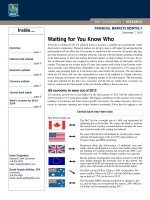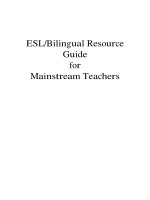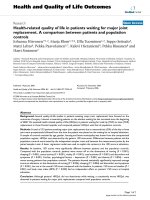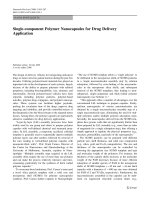ESL podcast 1071 – waiting for drug approval
Bạn đang xem bản rút gọn của tài liệu. Xem và tải ngay bản đầy đủ của tài liệu tại đây (96.51 KB, 10 trang )
English as a Second Language Podcast
www.eslpod.com
ESL Podcast 1071 – Waiting for Drug Approval
GLOSSARY
drug – a chemical or herbal substance used to improve one’s health, reduce
pain, or otherwise make one feel better, usually swallowed, injected, or smoked
* This drug has some dangerous side effects, including liver damage.
medication – a drug that is only for improving one’s health or reducing pain,
especially prescribed by a doctor
* Please bring a complete list of all your medications when you come in for your
next appointment with Dr. Pashtun.
FDA-approved – approved by the Food and Drug Administration, the
government agency responsible for making sure that products sold to and used
by Americans are safe
* Sheila is losing weight with the help of some FDA-approved diet pills.
experimental – being used as part of a research project or study to determine
how something works and whether it was safe
* The astronauts volunteered to go into space in an experimental rocket.
fast-tracked – rushed; being done more quickly than usual
* They paid more to have their passport applications fast-tracked, because they
need to arrive by next Friday.
to be tested on animals – to try to prove the benefits, risks, and/or safety of
something by trying to use it on animals before it is used on humans
* The company promises that none of its make-up products are tested on
animals.
lab – laboratory; a place where experiments are conducted and new things are
created, especially for sciences and engineering
* All students in the chemistry class have to work in the lab twice a week.
clinical trial – a research study that lets doctors observe the effect of a medicine
or treatment on a small group of patients before they become available for sale
and/or use
* The treatment has shown promising results in clinical trials, but the researchers
want to include more subjects in another clinical trial later this year.
rigorous – very thorough, detailed, challenging, and technical
* Military recruits have to complete a rigorous training program.
1
These materials are copyrighted by the Center for Educational Development (2015). Posting of
these materials on another website or distributing them in any way is prohibited.
English as a Second Language Podcast
www.eslpod.com
ESL Podcast 1071 – Waiting for Drug Approval
review – the process of observing something in detail, especially in order to
determine whether it is good enough or meets some standard
* How long did it take you to conduct a review of the applications?
alone – a word used to emphasize that nothing and nobody else was involved;
without including anyone or anything else
* Living in New York City is so expensive! The rent alone uses up more than 60%
of my paycheck!
needlessly – without any reason for do something; with no clear purpose
* Kristof spent all weekend worrying needlessly about the presentation, only to
find out on Monday that he wouldn’t have to speak at the conference after all.
to import – to bring something in from another country in order to sell it; to buy
something from another country
* The United States imports many cars from Japan, Korea, and Germany
to circumvent – to go around something; to find a way to avoid the rules and
restrictions against something
* Is there any way to circumvent tax laws for money earned overseas?
outlaw – a person who breaks the law and avoids being captured
* Police and investigators have been searching for that outlaw for years, but they
still haven’t found him.
healthy – for one’s body to feel well and without illness or disease
* Getting a good night’s sleep, drinking a lot of water, eating fruits and
vegetables, and getting enough exercise are all good ways to stay healthy.
2
These materials are copyrighted by the Center for Educational Development (2015). Posting of
these materials on another website or distributing them in any way is prohibited.
English as a Second Language Podcast
www.eslpod.com
ESL Podcast 1071 – Waiting for Drug Approval
COMPREHENSION QUESTIONS
1.
a)
b)
c)
Why does Alexander receive his medications in the mail?
Because the pharmacy ran out of what he needs.
Because it’s cheaper to buy them that way.
Because the medications cannot be sold in the U.S.
2.
a)
b)
c)
What does Alexander mean when he says, “I have to circumvent the law”?
He has the break the law.
He has to change the law.
He has to find a way to do something that the law doesn’t normally allow.
______________
WHAT ELSE DOES IT MEAN?
drug
The word “drug,” in this podcast, means a chemical or herbal substance used to
improve one’s help, reduce pain, or otherwise make one feel better, usually
swallowed, injected, or smoked: “Does your health insurance cover the costs of
these drugs?” The word “drug” also refers to narcotics, or illegal drugs like
marijuana and heroin: “It’s illegal to sell drugs, especially near schools.” The
phrase “to be drugged” means for someone to be given a drug secretly, usually
so that the person becomes unconscious (unaware of one’s surroundings):
“Hank was drugged at the bar, and when he woke up, he was in an unfamiliar
place and his wallet and cell phone had been stolen.” Finally, the phrase “to be
like a drug” means that an activity makes one feel very good and want to
continue doing it: “For some people, running is like a drug.”
alone
In this podcast, the word “alone” means all by itself; a word used to emphasize
that nothing and nobody else was involved: “If you buy that big truck, gas alone
will cost hundreds of dollars each month.” The word “alone” also means by
oneself, without anyone else: “At what age can a child stay home alone for a few
hours?” Or, “Could you please leave me alone for a few minutes?” The phrase
“to feel alone” means to feel very unhappy and wanting to be with other people:
“Jessie felt alone those first few weeks in a new city.” Finally, the phrase “to
leave (something) alone” means to not touch something: “Leave those packages
alone! They aren’t for you.”
3
These materials are copyrighted by the Center for Educational Development (2015). Posting of
these materials on another website or distributing them in any way is prohibited.
English as a Second Language Podcast
www.eslpod.com
ESL Podcast 1071 – Waiting for Drug Approval
CULTURE NOTE
Off-Label Use of Medication
In the United States, there are two types of medications: “over-the-counter”
(OTC) drugs, which can be purchased easily in stores, and “prescription
medications,” which are available only with a doctor’s “prescription” (a written
note from a doctor allowing a patient to buy a medicine that has restricted
availability, usually because it could be dangerous or addictive). Medications are
labeled with “indications” (reasons for taking the medicine) and recommended
“dosages” (the amount of medicine that should be taken, and how often). All of
the text on the “label” (the information found on the container in which the
medicine is sold) is developed and agreed to by the “pharmaceutical company”
(the company that develops, manufactures, and sells the drug) and the Food and
Drug Administration (FDA), and cannot be changed.
But sometimes people “disregard” (choose not to follow or pay attention to) the
information on the label. Instead, they “alter” (change) the use of the drug in what
is called “off-label use of medication,” because they are using it in a way that is
not described on the label. Off-label use could involve using the medicine to treat
a medical condition that isn’t included in the official indications. It could also
mean using the medicine for an unapproved age group, with an unapproved
dosage, or with an unapproved form of “administration” (how something is given
to a patient).
For example, some “stimulants” (substances that make parts of the body move
more quickly or make one feel more awake) are approved for treating attention
deficit disorder (ADD; a condition that makes it difficult for children to
concentrate) in children. Doctors often prescribe those same stimulants to treat
attention difficulties in adults, even though those the drugs have not been
approved for that use with adults.
______________
Comprehension Questions Correct Answers: 1 – c; 2 – c
4
These materials are copyrighted by the Center for Educational Development (2015). Posting of
these materials on another website or distributing them in any way is prohibited.
English as a Second Language Podcast
www.eslpod.com
ESL Podcast 1071 – Waiting for Drug Approval
COMPLETE TRANSCRIPT
Welcome to English as a Second Language Podcast number 1,071 – Waiting for
Drug Approval.
This is English as a Second Language Podcast episode 1,071. I’m your host, Dr.
Jeff McQuillan, coming to you from the Center for Educational Development in
beautiful Los Angeles, California.
Visit our website at ESLPod.com. Become a member of ESL Podcast. When you
do, you can download a Learning Guide for this episode.
This episode is a dialogue between Florence and Alexander about getting new
drugs, especially new drugs that need to be approved by the government. Let’s
get started.
[start of dialogue]
Florence: A package came for you. I think it’s from overseas.
Alexander: Oh, those are my drugs.
Florence: You’re buying your medication from overseas?
Alexander: I have no choice. This drug isn’t FDA-approved yet.
Florence: Isn’t it dangerous to take a drug that isn’t approved?
Alexander: Not if it’s been approved in other countries. This drug is considered
experimental here, but has been used in other countries safely for years.
Florence: But shouldn’t you just wait? How long could the process take anyway?
Alexander: You have no idea. It can take years for a drug to be approved here,
especially those that aren’t fast-tracked.
Florence: That’s hard to believe.
Alexander: It’s true. First, it has to be tested on animals or in a lab, and then it
has to go through clinical trials. Only then is it put through a rigorous review by
the FDA, which alone can take years.
5
These materials are copyrighted by the Center for Educational Development (2015). Posting of
these materials on another website or distributing them in any way is prohibited.
English as a Second Language Podcast
www.eslpod.com
ESL Podcast 1071 – Waiting for Drug Approval
Florence: You’re right. I had no idea.
Alexander: In the meantime, I’m suffering needlessly.
Florence: You can’t legally import the drug for your own use, right?
Alexander: That’s right, but I feel like I have to circumvent the law to get the
medicine I need.
Florence: So how does it feel to be an outlaw?
Alexander: Um, healthy?
[end of dialogue]
Florence begins our dialogue by saying to Alexander, “A package came for you.”
A “package” would be like a small box or perhaps an envelope. When something
“comes for you,” it arrives for you, usually in the mail. Florence says, “I think it’s
from overseas.” In the United States we use the term “overseas” (overseas) to
refer to other countries.
Now technically, in the U.S., Mexico and Canada are not overseas because you
don’t have to go over an ocean – “sea” is another word for “ocean” – in in order
to get there, but it’s a general term we use to mean from a foreign country, from
another country – specifically, from Europe or Asia or Africa – if you’re in the
United States, that is.
Alexander says, “Oh, those are my drugs.” “Drugs” are medication, medicine that
you take because you are sick, or for some other reason. Some people take
drugs even when they’re not sick. You’ll sometimes hear the word “drugs” used
to mean illegal drugs (drugs like cocaine, heroin, and marijuana) but it can also
be used to refer to what we call “prescription drugs” – drugs that you get from
your doctor because you are sick – or simply drugs such as aspirin or other kinds
of drug you can buy without the approval of a doctor.
Florence says to Alexander, “You’re buying your medication from overseas?”
“Medication” is just another word for drugs – things that you take to make you
feel better or to get healthy. Alexander says, “I have no choice” – I have no
option. “This drug isn’t FDA-approved yet.” “To be approved” means that
someone or some organization says it’s okay to use or to buy. The “FDA” is the
official government organization in the United States that approves of drugs. FDA
stands for “Food and Drug Administration.”
6
These materials are copyrighted by the Center for Educational Development (2015). Posting of
these materials on another website or distributing them in any way is prohibited.
English as a Second Language Podcast
www.eslpod.com
ESL Podcast 1071 – Waiting for Drug Approval
Florence says, “Isn’t it dangerous to take a drug that isn’t approved?” Alexander
responds, “Not if it’s been approved in other countries.” Florence is asking if he,
Alexander, thinks it is dangerous to take a drug that has not been officially
approved for use in the United States. Alexander says no, it’s okay if it has been
approved by other countries’ governments.
“The drug,” he continues, “is considered experimental here, but has been used in
other countries safely for years.” When we say a drug is “experimental,” we mean
that we are still researching it, we are still examining it. We’re not sure if it’s safe
yet. It’s not ready for everyone to use. “Experimental drugs” usually are drugs
that have not yet been approved for the average person to use. They can only be
used in experiments that are carried out – conducted – by researchers and
scientists.
Florence says, “But shouldn’t you just wait? How long could the process take
anyway?” Florence thinks that Alexander should wait until the FDA approves of
the drug for use here in the United States. Alexander has different ideas. He tells
Florence that, in fact, in the United States, it can take many years – a very long
time – for a drug to be approved.
He says, “You have no idea,” meaning you don’t really understand the situation
here. “It can take years for a drug to be approved here, especially those that
aren’t fast-tracked.” The expression “fast-tracked” (tracked) refers to something
that is done more quickly than usual – something that would normally take a long
time, especially in the approval of some plan or idea, that is instead approved
very quickly. Governments sometimes, if there is a serious illness or disease that
is affecting people, “fast-track” – approve something more quickly than they
would normally otherwise do.
Florence says, “That’s hard to believe.” Alexander says, “It’s true. First, it has to
be tested on animals or in a lab.” When we test drugs on animals, we give the
drug to an animal and see if the animal dies. For something to be “tested in a lab”
means that scientists and researchers look at the drug in a laboratory. The word
“lab” (lab) is short for “laboratory,” which is a place where scientists conduct their
experiments.
Alexander says, “Then it,” meaning the drug, “has to go through clinical trials.”
“Clinical (clinical) trials (trials)” are research studies that doctors do on a small
group of humans, of people who are sick, to make sure that the drug is safe.
Clinical trials are required for most drugs that are approved by the FDA in the
United States. You have to test the drug on a group of people to make sure that
7
These materials are copyrighted by the Center for Educational Development (2015). Posting of
these materials on another website or distributing them in any way is prohibited.
English as a Second Language Podcast
www.eslpod.com
ESL Podcast 1071 – Waiting for Drug Approval
it’s safe for the average person. Many times, you can get paid to participate in
these clinical trials. The government or drug companies will give you money to
participate in the experiment.
Alexander says, “Only then is it” – again, the drug – “put through a rigorous
review by the FDA, which alone can take years.” A “rigorous (rigorous) review
(review)” is a very thorough, detailed investigation of something – when you look
at something very closely to make sure that everything is okay. Alexander says
that the FDA’s review alone can take years.
The word “alone” here means by itself – not including all of the other steps, all of
the other things that have to happen in order for the drug to get approved. If you
say a person is “alone,” you mean that the person is by him or herself. There are
no other people with that person. Here, it refers to the fact that just this one thing,
just this one part of the process, can take many years, not including the time it
would take for all the other things to occur.
Florence says, “You’re right, I had no idea,” meaning “I wasn’t aware of this. I
didn’t know this before you told me. Oh, Alexander, you’re so smart. I love you.”
Oh, no – she doesn’t say that. Maybe Alexander is trying to impress Florence;
maybe Alexander is interested romantically in Florence and he’s just telling her
all of these things so that Florence will fall in love with his intelligence. You think?
Nah. Anyway, back to our story.
Alexander says, “In the meantime” – meaning while I am waiting for the FDA to
approve of this drug – “I’m suffering needlessly.” If something is done
“needlessly” (needlessly), it is being done without a good reason, without a good
cause. Alexander is saying that by waiting, he would be suffering. He would be in
pain, say, more, without any reason to, because he could get this drug from
another country.
Florence, however, reminds Alexander – or asks him, in any case – “You can’t
legally import the drug for your own use, right?” “To import” (import) means to
bring something into a country from another country. In the United States,
normally it’s not legal for you to buy drugs in another country and bring them into
the United States if those drugs are not legal already in the U.S.
Alexander says, “That’s right” – that’s correct; I can’t do that. “But,” he says, “I
feel like I have to circumvent the law to get the medicine I need.” “To circumvent”
(circumvent) means to go around something. Usually it’s used to mean to find a
way to avoid rules and restrictions that you don’t want to follow – to do something
that isn’t necessarily allowed by the rules, but allows you to do what you want to
8
These materials are copyrighted by the Center for Educational Development (2015). Posting of
these materials on another website or distributing them in any way is prohibited.
English as a Second Language Podcast
www.eslpod.com
ESL Podcast 1071 – Waiting for Drug Approval
do. In the case of Alexander, he’s circumventing the law. He’s really breaking the
law, going against the law, by bringing these drugs in, but it is something that he
thinks is helping him.
Florence says, “So how does it feel to be an outlaw?” The word “outlaw” (outlaw)
is an older term for a person who breaks the law, someone who has done
something illegal, but has not yet been arrested or caught by the police. Florence
is asking Alexander how it feels “to be an outlaw” – to be a criminal, in effect.
Alexander says, “Um, healthy?” meaning he feels healthy. He feels better, and
he feels better because, in fact, he was able to bring these drugs illegally into the
United States in order to make him feel better, in order to help cure him of
whatever disease he has.
Now let’s listen to the dialogue, this time at a normal speed.
[start of dialogue]
Florence: A package came for you. I think it’s from overseas.
Alexander: Oh, those are my drugs.
Florence: You’re buying your medication from overseas?
Alexander: I have no choice. This drug isn’t FDA-approved yet.
Florence: Isn’t it dangerous to take a drug that isn’t approved?
Alexander: Not if it’s been approved in other countries. This drug is considered
experimental here, but has been used in other countries safely for years.
Florence: But shouldn’t you just wait? How long could the process take anyway?
Alexander: You have no idea. It can take years for a drug to be approved here,
especially those that aren’t fast-tracked.
Florence: That’s hard to believe.
Alexander: It’s true. First, it has to be tested on animals or in a lab, and then it
has to go through clinical trials. Only then is it put through a rigorous review by
the FDA, which alone can take years.
Florence: You’re right. I had no idea.
9
These materials are copyrighted by the Center for Educational Development (2015). Posting of
these materials on another website or distributing them in any way is prohibited.
English as a Second Language Podcast
www.eslpod.com
ESL Podcast 1071 – Waiting for Drug Approval
Alexander: In the meantime, I’m suffering needlessly.
Florence: You can’t legally import the drug for your own use, right?
Alexander: That’s right, but I feel like I have to circumvent the law to get the
medicine I need.
Florence: So how does it feel to be an outlaw?
Alexander: Um, healthy?
[end of dialogue]
There’s no need for you to suffer needlessly in trying to improve your English.
The best drug for your condition is the writings of Dr. Lucy Tse and her wonderful
dialogues.
From Los Angeles, California, I’m Jeff McQuillan. Thank you for listening. Come
back and listen to listen to us again right here on ESL Podcast.
English as a Second Language Podcast was written and produced by Dr. Lucy
Tse, hosted by Dr. Jeff McQuillan. Copyright 2015 by the Center for Educational
Development.
10
These materials are copyrighted by the Center for Educational Development (2015). Posting of
these materials on another website or distributing them in any way is prohibited.









